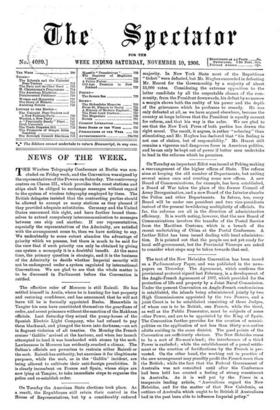NEWS OF THE WEEK * T HE Wireless Telegraphy Conference at Berlin
was con- cluded on Friday week, and the Convention was signed by the representatives of the Powers on Saturday. The controversy centres on Clause III., which provides that coast stations and ships shall be obliged to exchange messages without regard to the system of wireless telegraphy employed by them. The British delegates insisted that the contracting parties should be allowed to exempt as many stations as they pleased if they provided adequate substitutes. Germany and the United States renounced this right, and have further bound them- selves to extend compulsory intercommunication to messages between one ship and another. If our representatives, especially the representatives of the Admiralty, are satisfied with the arrangement come to, then we have nothing to say. We undoubtedly to some extent abandon the advantage of priority which we possess, but there is much to be said for the view that if such priority can only be obtained by giving one system a monopoly it is a doubtful benefit. At the same time, the primary question is strategic, and it is the business of the Admiralty to decide whether Imperial security will not be endangered under a system regulated by international Conventions. We are glad to see that the whole matter is to be discussed in Parliament before the Convention is ratified.














































